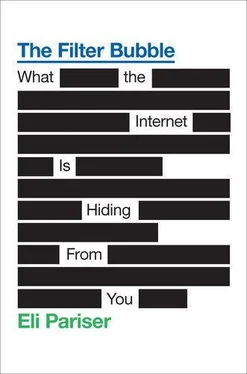Especially for people who’ve been socially ostracized due to quirks or brains or both, there are at least two strong draws to the world-building impulse. When social life is miserable or oppressive, escapism is a reasonable response—it’s probably not coincidental that role-playing games, sci-fi and fantasy literature, and programming often go together.
The infinitely expandable universe of code provides a second benefit: complete power over your domain. “We all fantasize about living without rules,” says Siva Vaidyanathan. “We imagine the Adam Sandler movie where you can move around and take people’s clothes off. If you don’t think of reciprocity as one of the beautiful and rewarding things about being a human being, you wish for a place or a way of acting without consequence.” When the rules of high school social life seem arbitrary and oppressive, the allure of making your own rules is pretty powerful.
This approach works pretty well as long as you’re the sole denizen of your creation. But like the God of Genesis, coders quickly get lonely. They build portals into their homespun worlds, allowing others to enter. And that’s where things get complicated: On the one hand, the more inhabitants in the world you’ve built, the more power you have. But on the other hand, the citizens can get uppity. “The programmer wants to set up some rules, to either a game or a system, and then let it run without interference from anything,” says Douglas Rushkoff, an early cyberbooster-turned-cyberpragmatist. “If you have a program that needs a minder to come in and help it run, then it’s not a very good program, is it? It’s supposed to just run.”
Coders sometimes harbor God impulses; they sometimes even have aspirations to revolutionize society. But they almost never aspire to be politicians. “While programming is considered a transparent, neutral, highly controllable realm… where production results in immediate gratification and something useful,” writes NYU anthropologist Gabriella Coleman, “politics tends to be seen by programmers as buggy, mediated, tainted action clouded by ideology that is not productive of much of anything.” There’s some merit to that view, of course. But for programmers to shun politics completely is a problem—because increasingly, given the disputes that inevitably arise when people come together, the most powerful ones will be required to adjudicate and to govern.
Before we get to how this blind spot affects our lives, though, it’s worth looking at how engineers think.
Imagine that you’re a smart high school student on the low end of the social totem pole. You’re alienated from adult authority, but unlike many teenagers, you’re also alienated from the power structures of your peers—an existence that can feel lonely and peripheral. Systems and equations are intuitive, but people aren’t—social signals are confusing and messy, difficult to interpret.
Then you discover code. You may be powerless at the lunch table, but code gives you power over an infinitely malleable world and opens the door to a symbolic system that’s perfectly clear and ordered. The jostling for position and status fades away. The nagging parental voices disappear. There’s just a clean, white page for you to fill, an opportunity to build a better place, a home, from the ground up.
No wonder you’re a geek.
This isn’t to say that geeks and software engineers are friendless or even socially inept. But there’s an implicit promise in becoming a coder: Apprentice yourself to symbolic systems, learn to carefully understand the rules that govern them, and you’ll gain power to manipulate them. The more powerless you feel, the more appealing this promise becomes. “Hacking,” Steven Levy writes, “gave you not only an understanding of the system but an addictive control as well, along with the illusion that total control was just a few features away.”
As anthropologist Coleman points out, beyond the Jocks-and-Nerds stereotypes, there are actually many different geek cultures. There are open-software advocates, most famously embodied by Linux founder Linus Torvalds, who spend untold hours collaboratively building free software tools for the masses, and there are Silicon Valley start-up entrepreneurs. There are antispam zealots, who organize online posses to seek out and shut down Viagra purveyors. And then there’s the more antagonistic wing: spammers; “trolls,” who spend their time looking for fun ways to leverage technology at others’ expense; “phreaks,” who are animated by the challenge to break open telecommunications systems; and hackers who break into government systems to prove it can be done.
Generalizations that span these different niches and communities run the risk of stereotyping and tend to fall short. But at the heart of these subcultures is a shared method for looking at and asserting power in the world, which influences how and why online software is made.
The through-line is a focus on systematization. Nearly all geek cultures are structured as an empire of clever wherein ingenuity, not charisma, is king. The intrinsic efficiency of a creation is more important than how it looks. Geek cultures are data driven and reality based, valuing substance over style. Humor plays a prominent role—as Coleman points out, jokes demonstrate an ability to manipulate language in the same way that an elegant solution to a tricky programming problem demonstrates mastery over code. (The fact that humor also often serves to unmask the ridiculous pieties of the powerful is undoubtedly also part of its appeal.)
Systematization is especially alluring because it doesn’t offer power just in the virtual sphere. It can also provide a way to understand and navigate social situations. I learned this firsthand when, as an awkward seventeen-year-old with all the trappings of geek experience (the fantasy books, the introversion, the obsession with HTML and BBSes), I flew across the country to accept the wrong job.
In a late-junior-year panic, I’d applied for every internship I could find. One group, a nuclear disarmament organization based in San Francisco, had gotten back to me, and without much further investigation, I’d signed up. It was only when I walked into the office that I realized I’d signed up to be a can vaser. Off the top of my head, I couldn’t imagine a worse fit, but because I had no other prospects, I decided to stick out the day of training.
Canvasing, the trainer explained, was a science as much as an art. And the laws were powerful. Make eye contact. Explain why the issue matters to you. And after you ask for money, let your target say the first thing. I was intrigued: Asking people for money was scary, but the briefing hinted at a hidden logic. I committed the rules to memory.
When I walked through my first grassy Palo Alto lawn, my heart was in my throat. Here I was at the doorstep of someone I’d never met, asking for $50. The door opened and a harried woman with long gray hair peeped out. I took a deep breath, and launched into my spiel. I asked. I waited. And then she nodded and went to get her checkbook.
The euphoria I felt wasn’t about the $50. It was about something bigger—the promise that the chaos of human social life could be reduced to rules that I could understand, follow, and master. Conversation with strangers had never come naturally to me—I didn’t know what to talk about. But the hidden logic of getting someone I’d never met to trust me with $50 had to be the tip of a larger iceberg. By the end of a summer traipsing through the yards of Palo Alto and Marin, I was a master canvaser.
Systematization is a great method for building functional software. And the quantitative, scientific approach to social observation has given us many great insights into human phenomena as well. Dan Ariely researches the “predictably irrational” decisions we make on a daily basis; his findings help us make better decisions. The blog at OkCupid.com, a math-driven dating Web site, identifies patterns in the e-mails flying back and forth between people to make them better daters (“Howdy” is a better opener than “Hi”).
Читать дальше











